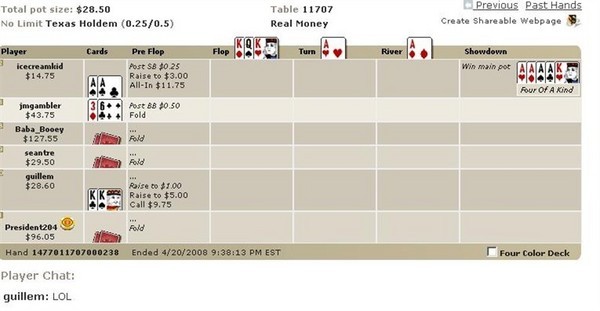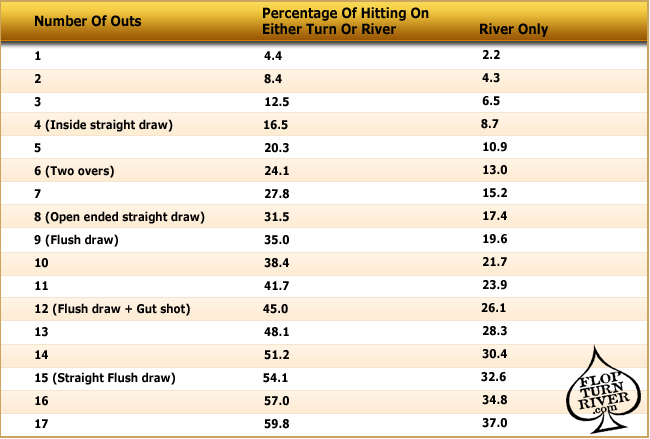Poker odds charts come in useful when you want to quickly work out the odds of winning a hand in Texas Hold'em. The most commonly used odds charts are the 'standard poker odds charts' below, which give both the percentage and ratio odds of completing your draw depending on the number of outs you have (see pot odds and drawing hands for more information).
The second set of odds charts highlight interesting odds for different situations in Texas Hold'em. These will help you get to grips with the different likelihood's and chances within the game of poker.
Real Money Poker Games » Texas Holdem Poker » after Flop Outs Percentages and Odds Holdem after Flop Outs, Percentages and Odds Chart For those unfamiliar with outs, an 'out' is the term used in the after-flop betting rounds to describe any card among the unseen cards in the deck that can substantially improve the value of your hand on the. Hand% Odds; AA: 0.45%: 220:1: 4 outs, drawing 2 cards from 52, need 2 of the outs. AA or KK: 0.90%: 110:1: Pocket Aces is 0.45, Pocket Kings is 0.45, add them together. The odds, when compared to the ratio of the size of bet to the size of the pot, are known as Pot Odds. The pot odds are a good indicator to help decide what betting action should be taken next. We have provided a table below of how many outs you have & the percentage chance that they you will hit them on the turn or river. Texas Hold'em Cheat SheetOdds Based on Outs after the Flop. If after the flop, you have: Two outs: Your odds are 11 to 1 (about 8.5 percent) A common scenario would be when you have a pair and you are hoping your pair becomes a three-of-a-kind (a set).
Standard poker odds charts.

Other poker odds charts.
Why use these odds charts?
There are currently many odds charts on the Internet at numerous poker websites. However many of these can be tricky to use. ThePokerBank provides easy to use charts highlighting the key draws on each, which makes them simple and effective to use during play.
I am confident that these odds charts are the easiest charts that you will ever use.
How to use poker odds charts.

Poker odds charts help you to determine how much you can call when trying to complete a drawing hand, such as a flush or a straight draw. By comparing your pot odds with the odds of completing your draw, you can work out whether or not it will be profitable to call certain sized bets from your opponents.

Poker Odds Vs Outside
Poker odds charts are most commonly used when working out pot odds.
It is perfectly possible to work out the odds of completing a draw in your head, but these odds charts make things much easier if you are looking for a quick reference or if you're just starting out. However, over time it is a good idea to learn the most common odds so that you no longer have to refer to any charts whilst you play.
Work out probabilities for yourself.
Don't just take my word for it or settle for the probabilities I've listed on the site, try working out probabilities for yourself. It's not as tricky or mathsy as you might think.
Poker Odds And Outs For Dummies

My guide on how to work out preflop hand probabilities gives a nice overview on basic starting hand probabilities. For flop probabilities and the likelihood of different combinations of cards on the flop, try the article on working out flop probabilities.
Go back to the handy Texas Hold'em tools.
For those unfamiliar with outs, an 'out' is the term used in the after-flop betting rounds to describe any card among the unseen cards in the deck that can substantially improve the value of your hand on the next card turned up.
For example, if after the flop you happen to have a total of four hearts, then your hand has nine 'outs' because there are nine of the original thirteen hearts still left in the unseen remaining deck. A much weaker draw hand would be for example, an inside straight. This hand only has four outs because the only cards left in the deck that can complete the straight would be the four cards of the missing denomination.
Of course, the more outs you have the better chance you have of making a strong hand. This chart offers some extra ways to look at and evaluate those chances. All Texas Holdem hands have 47 unseen cards after the flop and 46 after the turn. The chart is nothing more than the number of outs and these two unseen cards amounts, expressed in different ways.
Those on mobile devices or tablets may wish to view the holdem after flop outs odds chart in high quality .pdf format.
It might be interesting for you to note that when you double the number of outs, you get a number that is approximately the expected hit percentage of a single draw to your hand. For example, 8 outs equals about 16% (actually 17.02%) and 12 outs equals about 24% (actually 25.53%). You might find similar references or comparisons that you can use.